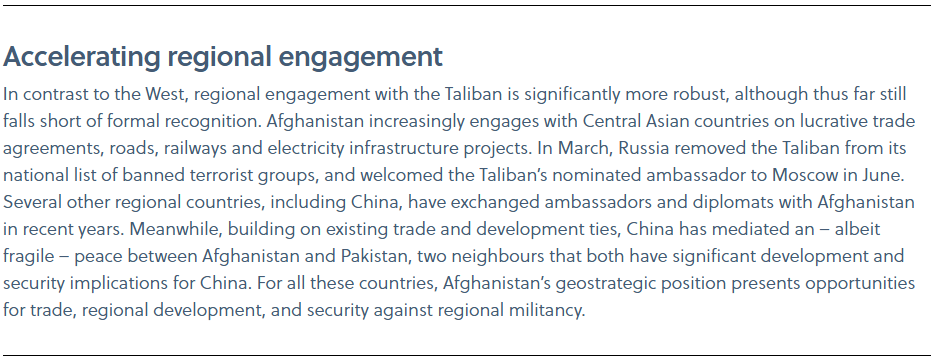Captives and compromise: Wrongful detention amid the Taliban’s push for recognition
“A goodwill gesture, reflecting Afghanistan's readiness to genuinely engage all sides.” This is how the Taliban described the release of US citizen George Glezmann, one of four US nationals released in the first three months of 2025. These releases are just the latest in a string of developments over the past year that signal small but notable shifts in the Taliban’s relations with the West. In March, US government officials travelled to Kabul and dealt directly with their Taliban counterparts, rather than through third-country mediators, bolstering the Taliban’s legitimacy as the country’s rulers. Several days later, the US removed bounties worth millions of US dollars from senior members of the Haqqani network – who also serve as leaders in the Taliban government. Some countries in Europe, too, have connected directly with the Taliban over the past year, including Germany, Italy and Spain, largely over ambassadorial positions and consular services on either side. Additionally, following years of relative stability, there is rising demand for Afghanistan as a tourism destination among more adventurous Western travellers, despite their governments’ warnings against such travel.
Dozens of Western nationals have been detained by the Taliban since 2021, on allegations of espionage or violations of strict local laws, or sometimes the charges are not publicised at all
Nevertheless, the Taliban remains severely isolated on the global stage. Since its takeover in 2021, member states of the UN Security Council have imposed sanctions against much of the group’s leadership, limiting trade and investment opportunities, and no single country (to date) formally recognises the Taliban regime. With relations between the Taliban and the West long strained by historic grievances, as well as the Taliban’s track record on human rights and its recent limitations on women’s rights, Western travellers – and NGO workers – have faced high levels of scrutiny, suspicion and occasionally, arrest by the Taliban authorities. Dozens of Western nationals have been detained by the Taliban since 2021, on allegations of espionage or violations of strict local laws, or sometimes the charges are not publicised at all. Detainees can spend several months – or years – in prison. The Taliban’s aspirations for international recognition, sanction relief, and trade will continue to drive its efforts towards engaging with the outside world, including the West. However, there are also significant hurdles to working with the Taliban, stemming primarily from deep ideological divides between Western and Taliban values, and a blanket refusal by the Taliban to concede to any requests for domestic reforms from foreign governments. Engagement will therefore remain limited to irregular advancements with individual countries, but with the West, core historical and ideological differences will impose greater limits on cooperation, and sustain the threat of detentions against their citizens.
Dynamics driving engagement
For the international community, motivations for engaging with the Taliban stem from pragmatic domestic considerations, rather than a blanket acceptance or rejection of the Taliban’s actions in Afghanistan. For the US, for example, and specifically President Donald Trump, the release of US citizens detained abroad is a key objective, as is the return of US military hardware that was left in Afghanistan in 2021. Additionally, the Trump administration is markedly more transactional in nature, comparative to former President Joe Biden, raising new opportunities for engagement with the Taliban. For Europe, too, there are reasons to engage, mostly relating to security against regional militant groups – the most prominent of which is Islamic State-Khorasan Province (ISKP) – and the need to preserve consular services for the tens of thousands of Afghan refugees in the region.
For the US, and specifically President Donald Trump, the release of US citizens detained abroad is a key objective, as is the return of US military hardware that was left in Afghanistan in 2021.

Roadblocks to recognition
Engaging with the Taliban, however, comes with significant challenges, for both regional governments and the world at large. Powerful, hardline elements within the Taliban have taken a strong stance against yielding any concessions to foreign countries; whether it relate to women’s rights (a key concern for Europe and other Western countries), ethnic representation in cabinet, or strategic cooperation against militant groups. The Taliban’s lingering links to Al Qaeda, and its current association with the Tehreek-e-Taliban Pakistan (TTP) has led to further suspicions that the Taliban’s counter-terrorism strategies are, and will remain, inadequate.
With the US, engagement may have already reached its limit; the Taliban is unlikely to return weapons to the US, and Trump’s cuts to US international aid has halted a critical source of aid and foreign currency to Afghanistan. Even for China, Afghanistan’s largest trading partner, insecurity and uncertainty around the surety of return on investment has limited the country’s appetite for extensive engagement. Chinese investors received a stark reminder of this in January, when ISKP militants killed a Chinese mining employee in Takhar Province.
The more things change…
Engagement with the Taliban will therefore develop in a limited and irregular fashion over the year to come, with notable advancements concentrated – and likely restricted – within the Central and South Asian region. For Western travellers and NGOs operating in Afghanistan’s education and healthcare spheres, the threat of detention remains ever-present, on charges that can range from espionage, to minor violations of the country’s conservative Islamist laws. Furthermore, with persistently strained relations with Western governments, those foreigners found to be breaking the rules can face lengthy detention periods, limited access to legal counsel and diplomatic service, and lengthy negotiations for prisoner releases, often complicated and elongated by the ebb and flow of geopolitical tension.
